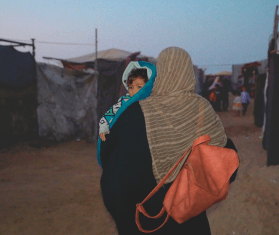The Sudanese people cannot afford for the international community to delay taking concrete steps to dramatically improve humanitarian access and the protection of civilians in Sudan, said Dr. Tammam Aloudat, president of the board of Doctors Without Borders /Médecins Sans Frontières (MSF) Netherlands today, addressing a United Nations General Assembly high-level ministerial event on “The cost of inaction: Urgent and collective support to scale up the humanitarian response in Sudan and the region.”
Dr. Aloudat explained how both warring parties have continued to obstruct humanitarian access as well as attack health facilities. He called on the international community to scale up its response, and for humanitarian organizations to ensure deliveries of critical supplies and food across the country.
Excellencies, colleagues: At this same high-level event last year, it was mentioned, and bears repeating, we have warned that without concrete steps to dramatically improve humanitarian access and the protection of civilians in Sudan, a catastrophe was imminent. Here we are, a year on. While many speakers today talk about their achievements and philanthropy, our collective failure couldn’t be clearer. The crisis in Sudan has reached a critical point. As Médecins Sans Frontières continues to provide medical services across the country, we face enormous challenges.
First, humanitarian access continues to be obstructed by both warring parties. In one simple example, in North Darfur, RSF forces have prevented us from reaching Zamzam camp and providing life-saving assistance for months. [At this camp] a third of the children are acutely malnourished and over 7,000 are at the risk of death. Opening the Adre crossing [from Chad into Sudan] is a step, but it is not enough. We demand that parties to the conflict allow the unhindered delivery of medical and food supplies.
Second, violence against civilians and health care continues unabated. Health facilities have been shelled, looted, and occupied, and health care workers are attacked, harassed, and intimidated. This violence results in enormous loss of life and severely limits our ability to function effectively. We demand that all parties to the conflict protect civilians and halt attacks on health infrastructure, and ensure the safety of medical and humanitarian personnel.
Finally, the international community must scale up the delivery of humanitarian assistance. We need to streamline processes to expedite the movement of aid. We need humanitarian organizations to manage risk, to ensure their presence, and predictably move supplies across the country, including food, vaccines, and medical supplies.
The cost of inaction is already unbearable. It can be measured in the tens of thousands of lives lost and the millions of lives that are on the line as we speak. The Sudanese people cannot afford for us to have this same conversation again next year. Thank you.




